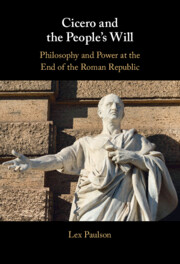Book contents
- Cicero and the People’s Will
- Cicero and the People’s Will
- Copyright page
- Dedication
- Contents
- Acknowledgments
- Abbreviations
- Introduction
- Part I The Practice of Voluntas
- Part II The Philosophy of Voluntas
- Chapter 6 Willpower
- Chapter 7 Free Will and the Forum
- Chapter 8 The Fourfold Self
- Conclusion
- Epilogue
- Appendix Occurrences of Voluntas in the Works of Cicero
- References
- Index
Chapter 7 - Free Will and the Forum
from Part II - The Philosophy of Voluntas
Published online by Cambridge University Press: 24 November 2022
- Cicero and the People’s Will
- Cicero and the People’s Will
- Copyright page
- Dedication
- Contents
- Acknowledgments
- Abbreviations
- Introduction
- Part I The Practice of Voluntas
- Part II The Philosophy of Voluntas
- Chapter 6 Willpower
- Chapter 7 Free Will and the Forum
- Chapter 8 The Fourfold Self
- Conclusion
- Epilogue
- Appendix Occurrences of Voluntas in the Works of Cicero
- References
- Index
Summary
At the beginning of the debate over free will, freedom is nowhere to be found. In the Hellenistic period, the question of human autonomy is not one of freedom (eleutheria) but instead, given the nature of the universe, what is “up to us” (eph’emin) and thus left to our choice (prohairesis). It is Cicero and the Epicurean poet Lucretius who first turn the debate into one specifically over man’s freedom from fate. But Cicero’s idea of the will’s libertas – its opportunity to conquer vice and win honor – is very different from that of Lucretius in De rerum natura, a text Cicero read and may even have edited. De fato, one of the last in his corpus, returns to the question of a libera voluntas explicitly to refute the Epicurean doctrine of the swerve (clinamen) and their abandonment of civic duty. For Cicero, free will is the locus of public virtue, the justification of “praise and honors,” and the power to strengthen ourselves against natural vice. Cicero’s letters reveal, in turn, that this technical treatise on fate has decidedly political stakes for the Roman Republic.
Keywords
- Type
- Chapter
- Information
- Cicero and the People’s WillPhilosophy and Power at the End of the Roman Republic, pp. 169 - 185Publisher: Cambridge University PressPrint publication year: 2022



